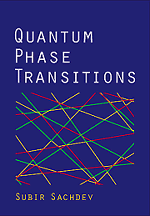Book contents
- Frontmatter
- Contents
- Preface
- Acknowledgments
- Part I Introduction
- Part II Quantum Ising and Rotor Models
- 4 The Ising Chain in a Transverse Field
- 5 Quantum Rotor Models: Large-N Limit
- 6 The d = 1, O(N ≥ 3) Rotor Models
- 7 The d = 2, O(N ≥ 3) Rotor Models
- 8 Physics Close to and above the Upper-Critical Dimension
- 9 Transport in d = 2
- Part III Other Models
- References
- Index
7 - The d = 2, O(N ≥ 3) Rotor Models
Published online by Cambridge University Press: 05 August 2012
- Frontmatter
- Contents
- Preface
- Acknowledgments
- Part I Introduction
- Part II Quantum Ising and Rotor Models
- 4 The Ising Chain in a Transverse Field
- 5 Quantum Rotor Models: Large-N Limit
- 6 The d = 1, O(N ≥ 3) Rotor Models
- 7 The d = 2, O(N ≥ 3) Rotor Models
- 8 Physics Close to and above the Upper-Critical Dimension
- 9 Transport in d = 2
- Part III Other Models
- References
- Index
Summary
The large-N limit of quantum rotor models in d = 2 was examined in Chapter 5 and led to the phase diagram shown in Fig. 5.2. There we claimed that the large-N results provided a satisfactory description of the crossovers in the static and thermodynamic observables for N ≥ 3. We shall establish this claim in this chapter and also treat the dynamic correlations of n at nonzero temperatures. The discussion of the dynamics shall take place in a physical framework suggested by the modified version of Fig. 5.2 shown in Fig. 7.1 The low-T region on the quantum paramagnetic side can be described in an effective model of quasi-classical particles that is closely related to those developed in Sections 4.5.2 and 6.2. In the other low-T region on the magnetically ordered side, we shall obtain a “dual” model of quasi-classical waves, which is connected to that developed in Section 6.3. Finally, in the intermediate “quantum critical” or “continuum high-T” region, neither of these descriptions is adequate: quantum and thermal behavior, as well as particle-and wavelike behavior, all play important roles, and we shall use a menage of these concepts to obtain a complete picture in this and the following two chapters.
The results for the quasi-classical wave regime described in this chapter will be obtained by a combination of analytical and numerical techniques, which become exact in the low-T limit.
- Type
- Chapter
- Information
- Quantum Phase Transitions , pp. 123 - 144Publisher: Cambridge University PressPrint publication year: 2000

